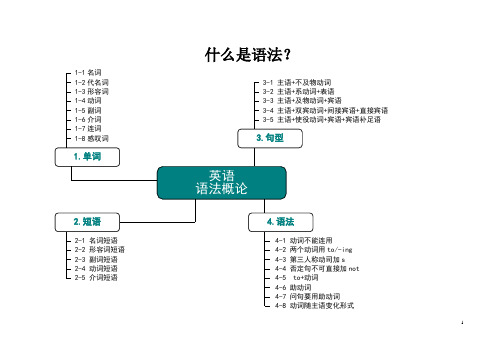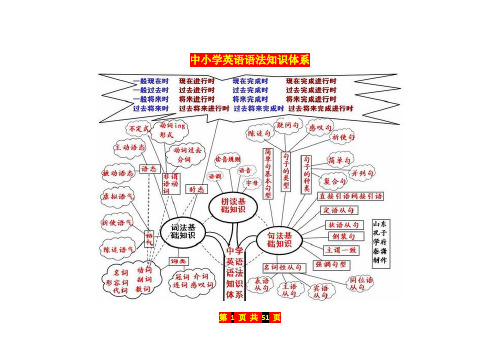01不定式的句法功能思维导图
- 格式:doc
- 大小:77.00 KB
- 文档页数:3

舟楫英语课堂精通句子结构非谓语动词(一)
(附表1)适合“It's + 形容词 + of +逻辑主语 + 不定式短语”句型中的形容词
(附表2)适合“It's + 形容词 + for+逻辑主语 + 不定式短语”句型中的形容词
(附表3)常用动词不定式作宾语的动词
(附表4)常用于“主语 + 谓语动词 + 人 + 不定式(宾补)”句型中的动词:
(附表5)常用于“主语 + 谓语动词(附表5) + 宾语 + 不带to的不定式(作宾补)”句型中的动词:
(附表6)作表语的不定式短语通常是说明主语的内容,这时主语通常是表示目的愿望一类的名词
(附表7)适合“主语 + be动词 + 形容词 + 不定式”句型中的形容词, 带星号的形容词后面常接:to see, to learn, to discover, to find out, to hear。



第十二章动词不定式思维导图知识梳理一、不定式概述动词不定式的基本形式是:“to+动词原形”,有时可以不带to.不带to的不定式与动词原形同形,但它不是原形,而是一种语法形式.除基本助动词do和情态动词外,英语动词都有不定式形式.动词不定式没有人称和数的变化,在句子中不能作谓语,但可以担任除谓语外的任何成分-主语、表语、宾语、定语、状语和宾语补足语.动词不定式和它的宾语或状语构成不定式短语.不定式有时态、语态变化(以do为例):主动语态被动语态一般式to do to be done进行式to be doing-完成式to have done to have been done 完成进行式to have been doing-动词不定式的句法作用(一)作主语用作主语的动词不定式通常表示一种具体的、特定的行为,其谓语动词用第三人称单数形式.To obey the laws is everyone's duty.服从法律是每个人的职责.How to use the computer is a question.怎么使用计算机是一个问题.How to get there is not decided yet.怎样去那里还没决定下来.点拨(1)在很多情况下,常用it作形式主语,而把真实主语不定式放在谓语之后.It was difficult to sell my car.我的车很难卖掉.It's not known where to stay for the night.在哪里过夜还不知道.(2)如果要表示不定式的动作是谁做的,一般在不定式前加一个for短语.It will be a regret for us not to help him.我们没有帮助他是个遗憾.(3)在某些形容词(如kind,good,nice,wise,unwise,clever,silly,wrong,right,foolish,stupid,careless, considerate,rude,naughty,impolite等)作表语时,不定式前常可加一个以of引起的短语,来说明不定式指的是谁的情况.It would be rude of us to refuse their invitation.(我们)拒绝他们的邀请,会显得无礼.(二)作表语作表语,一般紧跟在系动词,如:be,seem,get等后面,用以说明主语.The question is when to start.问题是什么时候启程.You seem to have lost weight.你好像减肥了.What we have to do first is to find a solution.我们得做的第一件事是找出一个解决办法.点拨当不定式所作的表语仅用来说明主语的内容时,这个不定式只作单纯的表语,而不具有未来的含义.(三)作宾语能以不定式作宾语的动词很多,常见的有:agree,begin,decide,expect,forget,hope,learn,like,manage, pretend,start,try,want,wish等.Do you wish to see the manager?你想见经理吗?They decided to learn English hard.他们决定好好学英语.Don't forget to meet me at6:00.别忘了六点钟和我见面.有些动词,如:tell,advise,show,teach,know,forget,learn,remember,show,understand,see,wonder,hear, find out,explain,decide,discuss等后面,常用带疑问词的不定式作宾语.We don't know who(whom)to ask.我们不知道问谁.We asked how to get to the station.我们问怎么到达车站.Have you decided where to go for your holidays?你们决定到哪儿度假了吗?I don't know whether to apply for the job or not?那份工作我不知道申请还是不申请?(四)作定语I have no time to waste.我没有时间可浪费.Let me find a place to park.我来找个停车的地方.He is always the first to come to work and the last to leave.他总是第一个来上班,最后一个走.点拨不定式修饰something,anything,nothing时,放在它们的后面.如果something,anything,nothing有形容词来修饰,词序是something(nothing...)+形容词+不定式.My father had something to do.我父亲有事要办.Have you got anything important to buy?你有什么重要的东西要买吗?(五)作状语不定式常可用作状语,修饰动词,表示行为的目的、结果、原因等.一般放在被修饰词之后,但在表示目的时,为了强调也可放在句首.1.作目的状语为加强语气在否定式前还可加上in order或so as组成词组(即:in order to...,so as to...),作状语表示目的.To live a long and healthy life,we must learn to have a balanced diet.为了能过长寿而健康的生活,我们必须懂得吃均衡的食品.I stayed there so as to see what would happen.我留在那儿,为的是想看看会发生什么事.In order to help him,we would do everything we can.为了帮助他,我们愿意尽一切力量.2.作结果状语表结果,其逻辑主语通常亦是全句的主语.在“so...as to...”“such...as to..“enough to...”“only to...”以及“too...to...”等结构中的不定式皆表示结果.She is old enough to go to school.她已到了可以上学的年龄了.He was too drunk to drive home.他酩酊大醉,没法开车回家.3.作原因状语She trembled to think of the terrible accident.想到那可怕的车祸,她就不寒而栗.We jumped with joy to hear the news.听到这消息,我们都高兴地跳了起来.(六)宾语补足语1、有很多动词的后面都可以有不定式作宾语补足语常见的这类动词有:advise,ask,tell,help,wish,want, expect,forbid,persuade,press,request,teach,warn等.She asked her grandfather to play game with her.她请爷爷跟她一起做游戏.Mother told me to cook the meal.妈妈叫我做饭.2.有一些动词后用作宾语补足语的不定式通常不带to,这种动词有两类:一类是感觉动词,另一类是使役动词感觉动词:如feel,see,hear,watch,notice等.使役动词:如make,let,have等.Let me do it for you.让我来替你做.Don't let her go out.别让她出去.I made him work hard.我迫使他加劲干.(1)动词help之后,复合宾语中的不定式可带to,亦可不带to.在上述动词转换为被动结构时,其后的不定式必须带to.He was seen to enter the theatre.有人看见他走进了剧院.I was made to do my homework the whole night.我被迫整晚做作业.Can you help me(to)move this table?你能帮我移动一下这张桌子吗?(2)感官动词的宾语补足语有两种形式:不带to的不定式和动词-ing形式.I heard Meimei singing in her room when I went past.我路过的时候听见梅梅在房间里唱歌.(路过的瞬间正在唱,所以用singing)We often hear Meimei sing in her room.我们经常听见梅梅在房间里唱歌.(经常听见,用不定式)I saw him come in.I saw him coming in.两句话的意思都一样:我看见他进来.用不定式着重于动作的全过程,用动词-ing形式则是强调当时动作的进行情况.3.当谓语动词为think,make,find,consider,feel,regard等词,作宾语的不定式后面有宾语补足语时,常用it作形式宾语,而将真正的宾语放在补足语的后面I find it easy to learn English well.我发现要把英语学好很容易.三、不定式的主要句型及注意事项(一)不定式的否定式不定式的否定式:not+不定式,经常和ask(tell)sb.to do sth.句型连用.She asked me not to drive him to the station.她要我不要开车送他到车站.Try not to be late.争取不要迟到.Mary asked me not to give my pen to Jimmy.玛丽让我别把笔给吉米.She decided not to come here again.她决定不再到这儿来.点拨不定式的否定式和否定句的区别:I asked him not to open the door.我让他别把门打开.I didn't ask him to open the door.我没让他把门打开.(二)不定式的进行时态进行式:表示在谓语动词所表示的动作或状态发生时正在进行.It's nice to be sitting here with you.在这儿陪你坐着是非常愉快的.It is unwise for him to be talking that topic all the time.他老是谈论这件事,很不明智.(三)不定式的完成时态完成式表示在谓语动词的动作或状态发生时已经完成.She said she was sorry to have missed you.她说她没见到你很遗憾.He seemed to have visited our factory.他好像参观过我们的工厂.They appeared to have met before.他们看来以前见过面.(四)动词不定式的被动语态表示被动意义I didn't want to be told about it.我不想被告知这件事.Nothing seems to have been forgotten.似乎什么也没有被遗忘.The building is said to have been destroyed in a fire two years ago.据说这幢大楼两年前已毁于一场大火.在以某些形容词,如kind,good,silly,honest,bad,stupid,bold,clever,cruel,courteous,nice,rude,sensible, tactful,wise,wrong等作表语时,后面需用以“of+名词(或代词宾格)+不定式”结构,以说明不定式所表示的动作的执行者是谁(即of短语是不定式的逻辑主语).It's very good of you to come.谢谢你的光临.How silly of you(it is)to make such a mistake!你出了这样的差错,多傻啊!It's very kind of you to say so.多谢你这么说.在had better,had best,would rather,would rather...than,would sooner,would sooner...than,cannot but,do nothing but等结构后面的不定式要省略“to”.You had better write it in English.你最好用英文写.I would rather stay at home.我宁愿待在家里.好题精练一、用-ing形式或不定式的适当形式完成句子1.Do you enjoy_________football?(play)2.Fred didn't have any money,so he decided_________a job.(take)3.We're going out for dinner,Would you like_________us?(join)4.The teacher reminded the students_________their test paper on time.(finish)5.When I was tired,I enjoyed_________TV.(watch)6.It was a nice day,so the old man agreed_________for a walk.(go)7.I'm not in a hurry,I don't mind_________.(wait)答案:1.playing2.to take3.to join4.to finish5.watching6.to go7.waiting二、选择括号内所给词组完成句子,注意括号内“go+v.-ing形式”构成固定搭配的用法(go boating;go fishing;go dancing;go running;go skating;go hunting;go singing)1.She's a good dancer.She always_________on Saturday.2.I've got a gun.I'll_________with that strong hunter next weekend.3.“Where is Tim?”“He has._________He always runs in the morning.”4.We have enough fish to eat.Our father_________every day.答案:1.goes dancing2.go hunting3.gone running4.goes fishing三、仿照示例改写下列句子示例:It is very interesting to play baseball.→To play baseball is very interesting.1.lt was not polite to speak that way before Mr.Lee.____________________________________________________________________________________________ 2.It can be quite easy to travel by air.____________________________________________________________________________________________ 3.lt will be no problem to arrive there before noon.____________________________________________________________________________________________4.To make those strangers believe us was so difficult.____________________________________________________________________________________________ 5.To help Tom speak Chinese well is not at all easy.____________________________________________________________________________________________答案:1.To speak that way before Mr.Lee was not polite.2.To travel by air can be quite easy.3.To arrive there before noon will be no problem.4.It was so difficult to make those strangers believe us.5.It is not at all easy to help Tom(to)speak Chinese well.四、选择填空1._________the bookstore,he stopped_________a few books.A.Passing;buyingB.Passing;to buyC.To pass;buyingD.Having passed;to buy2.Bruce,look at your dirty shoes,You'd better_________them right now.A.washedB.washingC.washD.to wash3._________the room,I found the computer_________.A.Entering;stealingB.Entering;stolenC.To enter;stealD.To enter;stealing4.We've worked hard for nearly one hour.Let's stop_________a rest now.A.haveB.to haveC.havingD.have had5.My mother always tells me not_________to the net bars(网吧).A.goB.to goC.goesD.going6.The teacher asked us_________English for half an hour in the morning.A.reads B reading C.to read D.read7.You will have to get up early tomorrow.Stop_________TV,Peter.A.watchesB.watchC.to watchD.watching8.I find it hard_________English well.A.learnB.learningC.to learnD.learns9.The teacher asked John_________a short talk in our class meeting.A.giveB.to giveC.gaveD.giving10.The girl was too poor_________a houseA.to buy;to live inB.to buy;to liveC.buy;to liveD.buying;living in11.It was very late at night,but Mr.Brown still went on_________.A.worksB.workedC.workingD.work12.Remember_________him about it before he goes away.A.tellB.to tellC.tellingD.to telling13.Lin Tao is strong enough_________the big box.A.carryB.to carryC.carryingD.carries14.Her mother told her_________in bed.A.not readB.not to readC.don't readD.to not read15.When class began,we stopped_________to the teacher carefully.A.listeningB.listenC.listensD.to listen16.You'd better_________the cinema by bus.A.don't goB.to goC.to go toD.go to17.What did the manager_________you to_________at the meeting?A.tell;sayB.ask;speakC.tell;speakD.ask;talk18.Tom was let_________in the gate house.A.waitB.to waitC.waitingD.to have waited19.Mr.Hu has enough time_________the job in two days.A.finishB.to finishC.finishingD.finished20.Look,the building_________is our library.A.is repairedB.being repairedC.repairingD.to be repairing21._________no money,I could not buy this coat.A.HaveB.HavingC.To haveD.Have had22.The teacher has something important_________us.A.to tellB.tellsC.tellingD.told23.Li Ming didn't know_________next.A.to do whatB.what to doC.how to doD.what do24.I'd love_________to your birthday party.eB.cameC.to comees25.It took me two hours_________by bus.A.to get thereB.to get to thereC.get thereD.get to there答案:1-5BCBBB6-10CDCBA11-15CBBBD16-20DABBB21-25BABCA五、改正下列句子的错误1.He seems to not hear from her.____________________________________________________________________________________________ 2.I hope see you soon.____________________________________________________________________________________________ 3.I made them to give the money back.____________________________________________________________________________________________ 4.The scientist gave us some advice on how learning English.____________________________________________________________________________________________ 5.No one noticed him to leave the room.____________________________________________________________________________________________ 6.Have you given up to smoke?____________________________________________________________________________________________ 7.We found him waited at the school gate.____________________________________________________________________________________________ 8.Why not to turn off the light?____________________________________________________________________________________________ 9.She didn't want me go.____________________________________________________________________________________________ 10.I don't know to swim.____________________________________________________________________________________________ 11.China is a developed country belonging to the third world.____________________________________________________________________________________________ 12.It's getting dark.We have to find a hotel to live.____________________________________________________________________________________________ 13.He said he had an important meeting to attended.____________________________________________________________________________________________ 14.They don't allow that people smoke.____________________________________________________________________________________________ 15.It's difficult sell my car.____________________________________________________________________________________________答案:1.He seems not to...2.I hope to see...3.I made them give...4....how to learn...5....him leave...6....given up smoking?7...him waiting...8.Why not turn off...9.She didn't want me to go.10.I don't know how to swim.11....a developing...12....to live in13....to attend.14....people to smoke.15...to sell my car.。


什么是语法?+表语+宾语+间接宾语+直接宾语+宾语+宾语补足语to/-ingsnot一般现在时vs.一般过去时一般将来时将来时表示将来某个时间要发生的动作或存在的状态,也表示将来经常或者重复发生的动作,常与表示将来的时间副词连用,例如:soon,next week, this afternoon,tomorrowWe will graduate next year.我们明年毕业。
进行时(1)(V+ing)现在分词(V+ing)现在分词(V+ing)?进行时(2)完成时(1)Part1 完成时的句型构成1-1 陈述句型:S+has/have+过去分词(p.p.)I have already finished my homework.(我已经完成了我的作业) 1-2 否定句型:S+has/have+not+过去分词(p.p.)Sandy has been a nurse in this hospital for 15 years.(珊蒂已经在这家医院担任护士长达15年了。
) 1-3 疑问句型:Has/Have+s+过去分词(p.p.)?Have you ever seen Peter in past 3 months?(过去3个月内,你看见过彼吗?)2-1 陈述句型:S+had+过去分词(p.p.)This proposal had been deliverde by Eva before Aaron finished it. (这个计划在艾伦完成以前,伊娃就已经提交出去了) 2-2 否定句型:S+had+not+过去分词(p.p.)I had not finished my work when he visited me last week.(上周他来拜访我以前,我还没有完成工作。
) 2-3 疑问句型:Had+s+过去分词(p.p.)?Had you ever been to a blind date before you married?(你结婚以前曾经参加相亲吗?)3-1 陈述句型:S+shall/will+have+过去分词(p.p.)They wll have finished the meeting by now. (他们现在应该已经开完会了) 3-2 否定句型:S+shall/will+have+not+过去分词(p.p.)We will have not made 10 apple pies by the end of today.(我们在今天结束之前不能做完10个苹果派。

同步语法思维导图-Unit 2 不定式【知识导图】【要点拓展】1.动词(短语)用作介词宾语时通常要用v.-ing形式,但but与except等词后要接动词不定式(短语)。
如果but和except前有实义动词do,不定式(短语)的to通常要省去。
I have no choice but to stay here. 我别无选择只能留在这里。
He did nothing last Sunday but repair his bike. 上星期天他除了修理他的自行车外什么也没做。
(but前有实义动词did,因此不定式短语不带to)2.不定式(短语)作动词find、think等的宾语,常用it作形式宾语,而将真正的宾语放在句末。
I thought it best to call first. 我认为最好还是先打个电话。
3.在表示感官、使役等意义的动词(短语)后,要用不带to的不定式(短语)作宾语补足语。
常见的:这类动词(短语)有feel、hear、listen to、see、watch、look at、notice等。
但是,句子是被动语态时,不能省略to。
She heard Tom go upstairs. 她听见汤姆上楼了。
The workers are made to work 12 hours a day. 工人们被迫一天工作12小时。
She was seen to read under the tree. (有人)看见她在树下看书。
4.不用不定式(短语)作宾语补足语的动词有hope、agree、demand、suggest、insist等。
我希望你早点来。
【误】I hope you to come earlier.【正】I hope you come earlier.【奇思巧计】不定式有标记,to与动词连一起。
没有人称数变化,动词特点它具备。
主宾定状表补语,唯独作谓不可以。
not加上不定式,否定结构要牢记。

非谓语动词思维导图1.在使用感官动词和使役动词时,常常使用“动词+宾语+do”结构,其中包括feel、hear、listen to、make、let、have、see、look at、watch、notice和observe等。
例如,It is right to give up smoking。
2.不定式可以用作主语、表语、宾语和宾语补足语,例如The XXX和XXX go。
3.一些动词可以使用“动词+宾语+to do+形容词或名词”结构,包括believe、consider、count、declare、deny、feel、find、guess、imagine、judge、know、prove、realize、suppose和think等。
例如,XXX。
4.不定式还可以用作状语和独立成分,例如To tell the truth。
I don't agree with you。
5.一些动词可以使用“动词+宾语+to do”结构,包括advise、allow、ask、beg、cause、challenge、XXX、dare、determine、direct、discover、drive、enable、expect、encourage、forbid、force、get、inform、invite、oblige、order、permit、persuade、prepare、mend、remind、request、require、send、teach、urge、want、warm和wish等。
6.不定式还可以用作目的状语、结果状语、条件状语和原因状语,例如I saw him go out、I plan to attend the meeting tomorrow、If you want to succeed。
you must work hard和Heleft to avoid an argument。


中小学英语语法知识体系第1页共51页方法篇第2页共51页第3页共51页第4页共51页形容词第5页共51页动词第6页共51页动词的ing形式第7页共51页非谓语动词第8页共51页助动词第9页共51页常见助动词用法第10页共51页分词第11页共51页副词第12页共51页数词第13页共51页代词的分类第14页共51页人称代词第15页共51页物主代词第16页共51页反身代词第17页共51页指示代词第18页共51页疑问代词第19页共51页关系代词第20页共51页第21页共51页不定代词第22页共51页冠词第23页共51页形容词和副词的比较等级第24页共51页有关比较级的区别第25页共51页不定式句法功能第26页共51页不定式作主语第27页共51页不定式作宾语第28页共51页不定式作补语第29页共51页不定式的时态和语态第30页共51页省to的动词不定式第31页共51页doing & to do第32页共51页第33页共51页句子的种类第34页共51页16种时态第35页共51页一般现在时第36页共51页一般将来时第37页共51页现在完成时第38页共51页一般过去时第39页共51页现在进行时第40页共51页第41页共51页第42页共51页第43页共51页第44页共51页第45页共51页第46页共51页第47页共51页第48页共51页第49页共51页第50页共51页。

